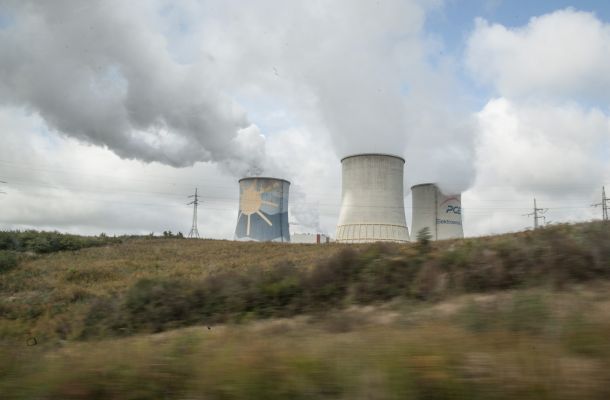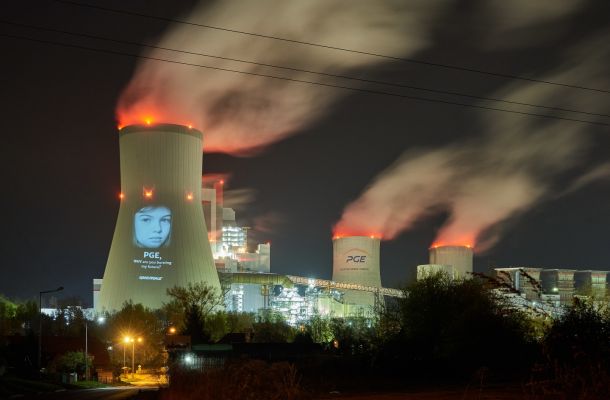The crisis is a dead cert
New report on the role of banks in financing fossil fuels
Author: Hanna Schudy
There are such black sheep among banks that still rely on fossil energy sources. They deepen the climate crisis and their own risk of insolvency. Now, in the face of a coronavirus pandemic and climate change, secure energy is needed as well as savings in the budget.
Economists “would likely push the earth to a place that we haven’t seen for many millions of years” - it sounds like a slogan on the banners of youth strikes, but in fact it is the statement in the report of analysts prepared for the JP Morgan bank who wanted to know how climate change affects the economy and finance. The bank's gesture seems quite ambivalent, as it turns out that this bank is absolutely at the forefront of those financial institutions that generously finance fossil fuels.
Safe as in a bank?
How do we know the real intentions of JP Morgan? The 11th report "Banking on climate change" has just been published by organizations monitoring the impact of financial institutions on climate. They include Rainforest Action Network, BankTrack, Indigenous Environmental Network, Oil Change International, Reclaim Finance and Sierra Club. Moreover, the report was supported by 250 other organizations from 45 countries. We learn from it who and how much still invests in fossil fuels.
Publication of the report during the coronavirus pandemic must be difficult, because the attention of world public opinion is focused on another topic - we ask ourselves how to survive this difficult time and how to protect our loved ones. On the other hand, the publication of this specific report can be read even more carefully. We are interested in the security of investing as never before. The most ardent opponents of state interventionism are looking at countries as those entities that provide services regardless of the economic status of those in need. Moreover, even committed nationalists feel that in an era of threats such as coronavirus or climate change, nation-states will not be able to protect their own citizens. All the more we appreciate the monitoring of public money spending, as these funds are willingly used by bankrupt private banks, when it turns out that their investment strategies were too "bold".
When subsequent hospitals alert that we are not prepared for the current pandemic and that recommendations for careful examination of possible zoonosis have been neglected for years, it can be quite devastating that we still have large private institutions that ignore scientists' warnings and the provisions of the Paris Agreement on counteracting the climate crisis. The report says that since the Paris Agreement, as many as 35 of the world's largest banks have financed fossil fuels with nearly $ 2.7 trillion! Support for fossil fuels was also provided in 2019 - in a year of natural disasters of an unprecedented dimension such as fires in Australia or hurricanes with a capacity of the power of wind exceeding our imagination,
absolutely record-breaking in terms of temperatures.
Thus, in the report we find information about banks financing fossil fuels, but we can also see their individual investments, e.g. in the construction of a mine or power plant. We also get information about where the fossil fuels financing comes from. In the ranking of the most "climate-eating" banks, they are all based in the USA: JPMorgan Chase, Wells Fargo, Citi, Bank of America. In Canada, RBC is considered the worst bank for the climate, Barclays is in the lead in Europe, BNP Paribas in France. MUFG turned out to be the leader in Japan.
PGE with Italian, Spanish and Japanese capital
Financing fossil fuels is becoming increasingly difficult. The institutions are aware of the financial risks that are associated with coal energy. We also have reports showing the profitability of individual investments. For example, IEEFA assessed that the mines planned by PGE Złoczew or Turów will not be profitable. But there's a nut for every bolt - there are banks which will finance PGE investments, although they are not economically attractive. These banks, the Spanish Santander, the Japanese MUFG and the Italian bank Intesa Sanpaolo, have provided PGE with support for almost EUR 1 billion despite warnings: "Investing billions of euros in lignite mining for the next decades does not make economic sense, since it is known that the Polish energy system will have to undergo a transition from coal to more affordable and less polluting energy sources” said Gerard Wynn, IEEFA financial consultant.
Climate changes and coronavirus undermine fossil fuels
Millions of euros in loans granted to a Polish state-owned company are certainly not a big deal for Santander, for example. After all, the borrower is a company belonging to the state, much more solvent than a private client. However, the question is what will the repayment of this loan look like in the face of rising energy prices from coal, rising euro exchange rate and economic decline caused by a pandemic. The one likely to lose on this deal is Poland, which at the same time will have to spend money dealing with the course and effects of the coronavirus crisis, but soon it will be drought and other natural disasters.
You don't find 1 billion euro on the street and it could be used for other expenses. If we compare this money with the support that Poland can get for the energy transformation, 1 billion euro looks impressive, especially since it will be thrown away anyway. Let's add that PGE recently announced impairment of its assets at PLN 7.5 billion, which means that company admitted that they are worth less today than previously assumed. This happened in March 2020, so after the loan was granted by Santander (October 2018). If we also take into account the fact that the renewable energy industry may be affected by the coronavirus crisis, this money seems all the more needed.
The current crisis teaches us the importance of being prepared for risk, listening to experts, and responding quickly. Disregarding these elements is a ready recipe for so-called "coronavirus Italian case". It seems that in the case of energy we are facing the "Polish case”, which will mean gigantic prices of coal electricity, deepening the problem of drought in Poland, a decrease in yields and a further tens of thousands of premature deaths due to air pollution.
Kuba Gogolewski, a financial expert from the foundation "Development YES - Open-Pit Mines NO", leaves no doubt: "The change in attitude of private banks, public banks, insurance and reinsurance companies together with the accelerated coronavirus epidemic, the slowdown in the world economy and a decrease in energy demand also mean that Poland will not have any new coal-fired power plants or lignite mines in 2020. The Złoczew open-pit and Ostrołęka C power plant are now becoming a thing of the past. The economic slowdown and the dramatic fall in oil prices also call into question the PKN Orlen and PGNiG mining projects. We should remember that the report analyzes historical loans (until 2019), but 2020 will be significantly different from previous years, also in terms of financing fossil fuels. Companies controlled by the Polish Ministry of State Assets : PKO BP, PZU and Pekao S.A. should catch up lessons quickly and adapt their policies to the climate challenges that Poles will face in the coming decades.”
It is hard to know whether politicians will understand the challenge facing our country. However, citizens should be aware of this and take matters into their own hands early, forcing the authorities to act responsibly. In the end, it will be us suffering because of the "Polish case”.
Popularne Artykuły
PGE myths vs reality
Why are you burning our future?
Polish prime minister dismisses for the truth about Turów
About Us
Our organizations jointly counteract the expansion of the open-cast Turów lignite mine in Poland for the benefit of local communities, nature and climate. We support civic activities undertaken by the international community at the interface of the Czech Republic, Germany and Poland. We strive to make the lignite-dependent Bogatynia enter the path of energy transition as well as economic and social transformation.





